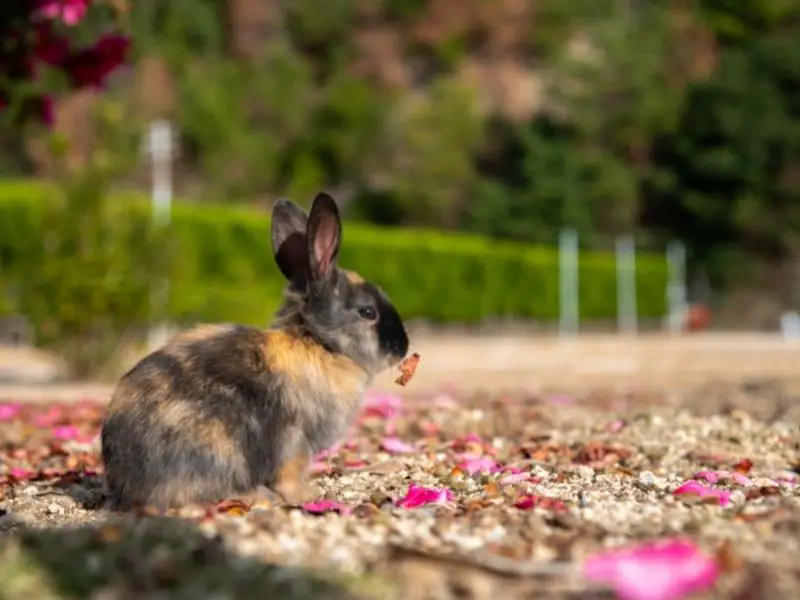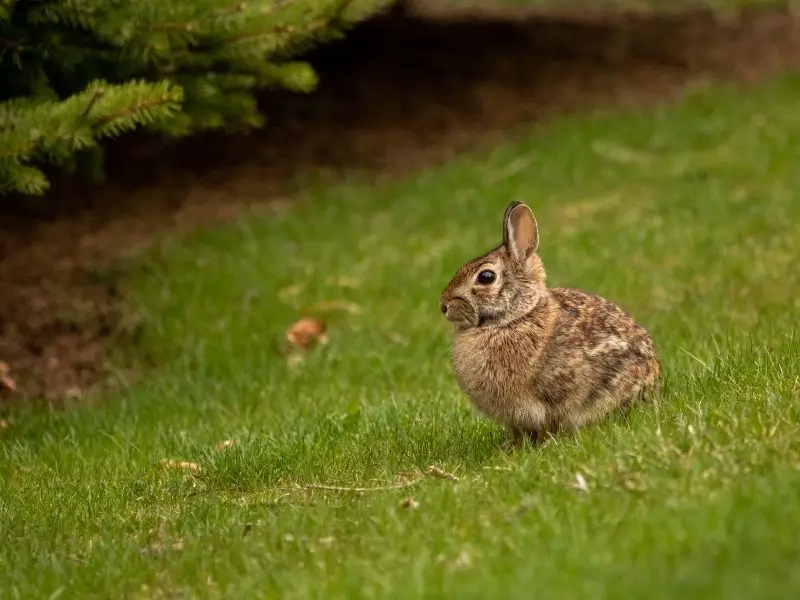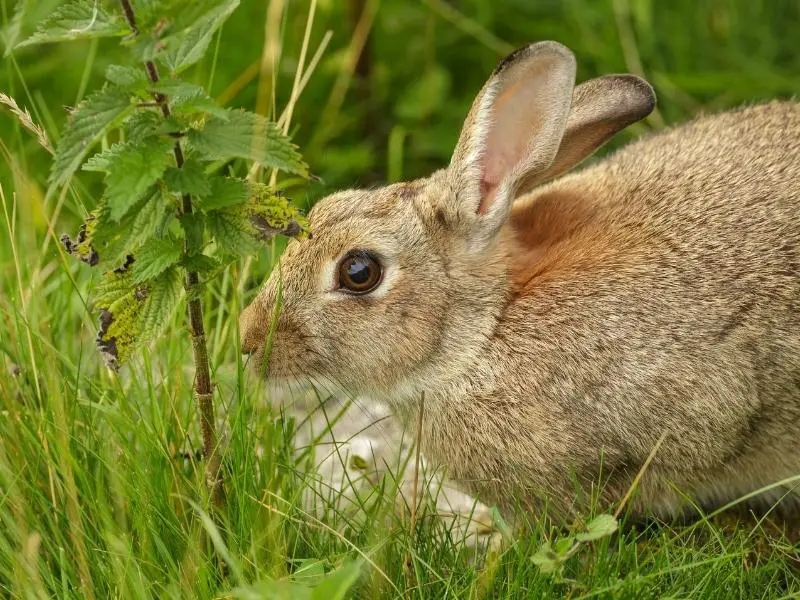If you live in an area where there are plenty of wild rabbits, it’s natural to think you can keep one of the cute rabbits and tame it to be your new fluffy bestie. But can a wild rabbit be a pet, or are their wild nature and state laws against you?
A wild rabbit won’t make a good pet for various reasons. Wild rabbits are wild and lead different lives compared to domesticated bunnies. They also carry more infectious diseases, which can be passed on to your other pet buns or you. In most states, it’s illegal to keep a wild rabbit as a pet.
If you’ve ever wondered about taming wild rabbits and keeping them as pets, this comprehensive guide on why you shouldn’t is a must-read.
Can Wild Rabbits Be Tamed?
Wild rabbits can be tamed, but you need to be educated and experienced in handling wild rabbits. It’ll be a long process, and you’ll need lots of patience and some tricks up your sleeve to get the rabbit to trust and accept you.
But in general, wild rabbits cannot be tamed, and they shouldn’t be either.
They are different species and genera from domesticated rabbits even though they look the same. Did you know that a wild rabbit can’t even breed with your pet bunny? Yip, that’s true.
Wild Rabbit vs Domesticated Rabbit: What Are the Differences?

Here are the differences that make wild rabbits different from the furry bunnies we keep as pets.
These differences will also make it clear why wild rabbits aren’t suitable for life as your bunny bestie.
Lifespan
There’s a big disparity when it comes to how long a domestic rabbit vs a wild rabbit lives.
Fur-parents who look after their pet bunnies well can expect their furry bestie to live between 6-10 years; however, wild rabbits only live an average of 1-2 years.
Wild rabbits are prey animals, and there are many predators that will be more than happy to have a rabbit as a meal.
Habitat
A pet rabbit usually lives inside its fur parents’ home in a cage or enclosed area, or outside in a rabbit hutch.
On the other hand, a wild rabbit lives in the wild – fields, grasslands, and wooded areas. These rabbits dig underground tunnels – called burrows – and they sleep and hide here with their family or warren.
Diet
Domestic and wild rabbits are herbivores. They live off a plant-based diet and don’t typically consume any animal meat.
The diet of a pet bunny consists primarily of high-quality hay and access to water. The bun is fed twice a day and gets 2-3 types of leafy green veggies and herbs and pellets. Fruit and high-calorie vegetables serve as occasional treats.
In the wild, rabbits eat a varied diet, depending on what’s available and what they can find to eat. In spring and summer, wild rabbits eat clover, shrubs, grass, wildflowers, and other plants. In winter, they eat dead leaves and plants, conifer needles, bark, buds, and twigs.
Behavior and Personality
The behavior and general personality of wild rabbits and pet rabbits are very different.
Domestic rabbits are generally shy, but when they get used to you, they are sweet, friendly, curious, and affectionate. They are quite playful too.
Wild rabbits know they need to be super careful; otherwise, they end up being eaten or hurt when a predator is nearby. These rabbits have learned that anything big means danger, and they are constantly on guard and on the lookout for any threats.
If you try to tame a wild bunny, you should expect them to be shy and fearful. They’ll likely lash out at you by trying to bite, scratch, or kick you.
They don’t ever expect to not have their four paws on the ground, so if you try to pick them up, you’ll likely get hurt.
So Should You Make a Wild Rabbit Your Pet?

A wild rabbit is born to be wild and thrives in its natural habitat, even though they don’t have a long life expectancy.
In short, here are the reasons a wild rabbit should not be pet:
They Are Wild
These rabbits only know fight or flight when they are alerted to a nearby predator. And while you want to feed and take care of the bunny and aren’t a predator as such, the rabbit won’t know that.
To them, you are bigger than they are, and they’ll be scared. It’s likely that the rabbit will run away, and they will only try to hurt you if you pick them up.
Diseases
Another reason you shouldn’t take a wild rabbit and keep it as your pet is that wild rabbits carry various diseases like myxomatosis, viral hemorrhagic disease, and tularemia (rabbit fever).
If you have a pet rabbit (the domestic kind), any of these diseases can make your bunny sick, and it’s likely to be fatal. The viral hemorrhagic disease can spread to cats and dogs.
Humans can get tularemia, and if not treated immediately, they can die.
Other zoonotic diseases a wild rabbit may have that can spread to you and/or to your other domestic pets are:
- Hantavirus
- Pasteurellosis
- Ringworm
- Leptospirosis
- Mycobacteriosis
- Cryptosporidiosis
- Other parasites
Illegal
Whether you can keep a wild rabbit as a pet may be a moot point depending on where you live. In most states, it is illegal to keep wild rabbits without a permit or state license.
Findlaw.com has a list of states and what wild animals you may own, which are illegal to own, and which you need a permit for. For example, it’s illegal to own wild hares and rabbits in Georgia, Kentucky, and Minnesota. In Indiana, you need a permit to have an Eastern cottontail rabbit in your possession.
If you do want to have a wild rabbit as a pet, check your state and local laws first to make sure you aren’t doing anything illegally.
Pet Behavior
Wild rabbits aren’t likely to ever trust a human, unlike their domestic cousins. They’ll feel stressed and on alert the whole time, so they may stop eating, which can lead to GI stasis.
The diet a domestic rabbit eats isn’t suitable for a wild rabbit as they are used to foraging for food and eating lots of variety every day.
Wild rabbits are used to roaming in the wild, and being kept in a cage will make them anxious. They’ll be even more skittish and will try anything they can to escape. They can easily die of a heart attack because they aren’t used to people and the noises in your house.
While you can bond with a pet bunny – and this takes time – a wild rabbit won’t feel comfortable coming over to investigate the treat you are holding for them, and they won’t be curious to see what you are about or up to.
The wild bunny won’t tolerate being petted or picked up, and you’ll get hurt since the rabbit thinks you are trying to eat them.
Is It OK to Touch a Wild Rabbit?
It isn’t safe to touch a wild rabbit – for the animal and for you.
Wild animals like rabbits carry various parasites and diseases that can be harmful to you. And if you don’t wash your hands after touching a wild rabbit and then touch your domestic bunny and other pets, the disease can spread this way.
Your domestic pets will become ill and may even die.
The reverse is also true. You can expose a wild rabbit to pathogens they have no immunity against in a process called reverse zoonosis.
The wild rabbit can become sick and can die, or even worse, it can transmit the pathogen or disease to its colony or other animals, which can kill them.
Can a Wild Baby Rabbit Be a Pet?
A wild baby rabbit is still a wild rabbit. They have the instincts of wild rabbits, not domestic rabbits. And wild baby bunnies rarely make good pets, just like adult wild rabbits.
However, if you find a wild baby rabbit, the best thing you can do is leave it alone. Its mommy wild rabbit will come back and feed the baby and look after it.
If you are concerned, keep watch over the baby bunny from a safe distance and see if the doe rabbit returns. The mother rabbit will come and feed the baby twice a day.
If the baby rabbit is injured and needs help, contact your local wildlife rehabilitator or local wildlife rescue center. Your vet can also help you.
These professionals are able to advise you so you can do what’s best for the wild bunny.
My Last Wild Bunny Thoughts
Wild rabbits like cottontail rabbits are best left to their own devices in the wild. It is their natural environment, and it’s where they thrive.
Removing them from a place they know as home causes the wild rabbit stress, which can lead to dire consequences. These animals are used to fleeing from predators or fighting, so they’ll try to flee from you or fight and injure you.
In general, wild rabbits do not make good pets – they may look similar to domestic bunnies but they aren’t the same. And it may also be illegal to keep a wild bunny as a pet.

